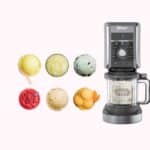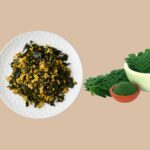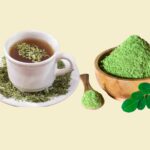Staying hydrated is vital for maintaining a healthy lifestyle, and while drinking water is essential, why not supplement it with hydrating fruits?
Nature has bestowed us with a variety of fruits that not only tantalise our taste buds but also provide a substantial amount of water content. In this blog, we will delve into 11 surprisingly hydrating fruits that will not only quench your thirst but also contribute to your overall hydration levels. Let’s explore these delicious and refreshing wonders!
11 Surprisingly Hydrating Fruits
1. Watermelon: A Summer Quencher
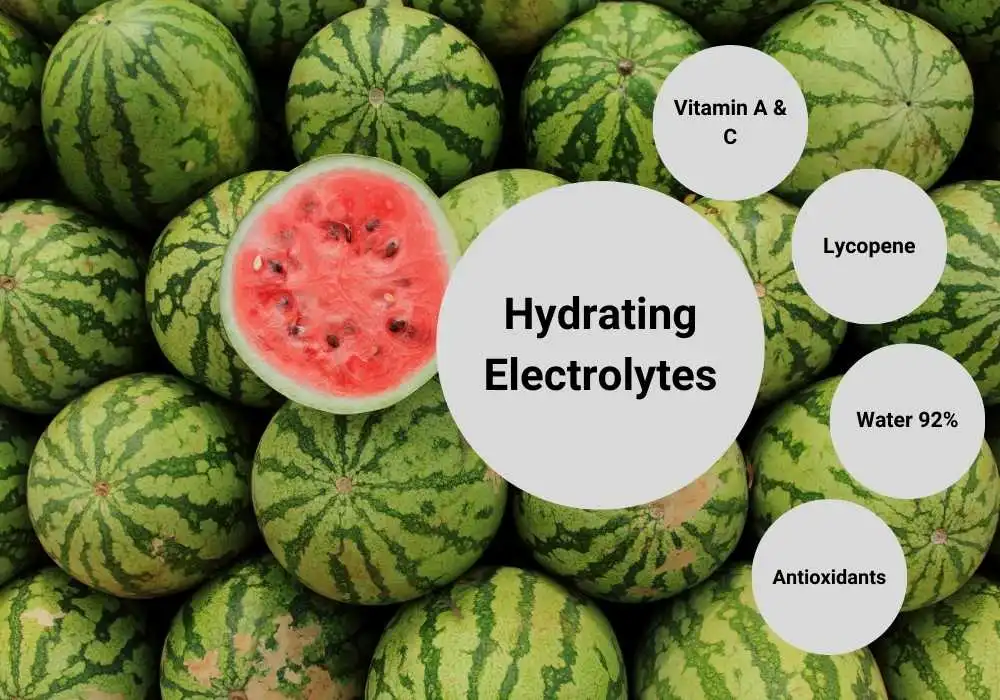
Watermelon, with its vibrant red flesh and refreshing sweetness, is a beloved fruit that epitomizes summer. Beyond its delightful taste, watermelon offers a range of nutritional benefits, making it a standout choice for those seeking hydration and nourishment. The nutritional benefits of watermelon and delve into its excellent water content, making it an unparalleled hydration source during the hot summer months.
Related: Innovative Ways To Integrate Hydrating Fruits Into Daily Diet
Nutritional Benefits:
Watermelon is not only a delicious treat but also a nutrient powerhouse. Here are some of the essential nutritional benefits of consuming watermelon:
Vitamins and Antioxidants: Watermelon is a rich source of vitamins A, and C. Vitamin A supports healthy vision, immune function, and cell growth, while vitamin C acts as a powerful antioxidant, protecting cells from damage and aiding in collagen synthesis.
Hydrating Electrolytes: In addition to water, watermelon contains essential electrolytes such as potassium and magnesium. Potassium helps maintain proper fluid balance, nerve function, and muscle contractions, while magnesium supports bone health and energy production.
Lycopene: Watermelon is renowned for its high lycopene content, a carotenoid pigment responsible for its vibrant red colour. Lycopene is a potent antioxidant associated with a reduced risk of chronic diseases, including certain cancers and cardiovascular diseases.
Water Content: The Ultimate Hydration Source:
When it comes to staying hydrated, watermelon is an exceptional choice. This refreshing fruit contains approximately 92% water, making it an excellent natural hydrating fruit. With its high water content and minimal calorie density, watermelon can be a valuable addition to any diet, especially during hot summer days.
Proper hydration is crucial for maintaining optimal bodily functions, regulating body temperature, and supporting digestion. Consuming watermelon can contribute significantly to meeting daily hydration needs, helping to quench thirst and replenish fluids.
2. Cucumber: Crispy and Refreshing
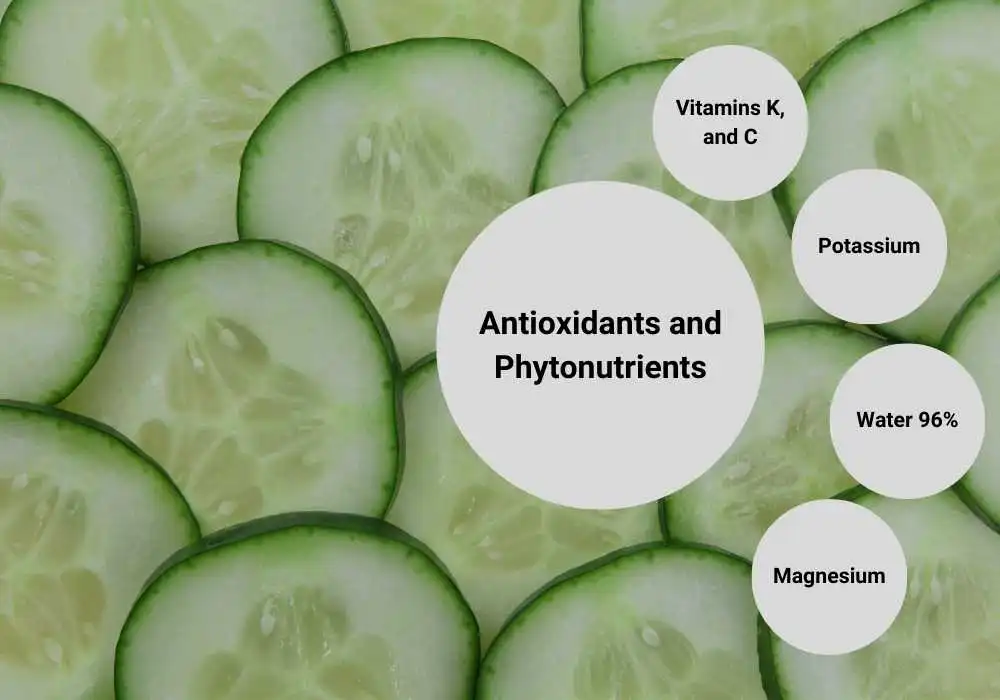
Crisp, cool, and incredibly refreshing, cucumbers are a staple in salads, sandwiches, and spa water alike. With their high water content and crunchy texture, cucumbers are often celebrated for their ability to provide instant relief during scorching summers.
Nutritional Benefits:
Despite their mild flavour and low-calorie count, cucumbers pack a surprising nutritional punch. Here are some key nutritional benefits of including cucumbers in your diet:
Hydration and Fiber: Cucumbers are composed of about 96% water, making them an excellent hydrating food. Additionally, their high water content combined with dietary fibre promotes hydration and helps maintain healthy digestion.
Vitamins and Minerals: Cucumbers are a good source of various vitamins and minerals, including vitamin K, vitamin C, potassium, and magnesium. Vitamin K is essential for blood clotting and bone health, while vitamin C supports immune function and collagen synthesis. Potassium and magnesium are important for maintaining proper nerve function, muscle contractions, and electrolyte balance.
Antioxidants and Phytonutrients: Cucumbers contain antioxidants such as flavonoids, lignans, and triterpenes, which help protect against cellular damage caused by free radicals and oxidative stress. These compounds may have anti-inflammatory and potential anticancer properties, contributing to overall health and well-being.
Related: How Can I Hydrate Fast? 7 Proven Methods For Rapid Hydration
Water Content: The Cooling Agent:
One of the standout features of cucumbers is their impressive water content 96%, which makes them a perfect natural coolant. The abundant water found in cucumbers not only helps to keep you hydrated but also aids in regulating body temperature and promoting overall refreshment.
During hot weather or physical activity, consuming cucumbers can provide a soothing and cooling effect, helping to combat the heat and prevent dehydration. Their refreshing crunch and high water content make them an excellent addition to summer salads, beverages, and even skincare routines.
3. Pineapple: Tropical Hydration
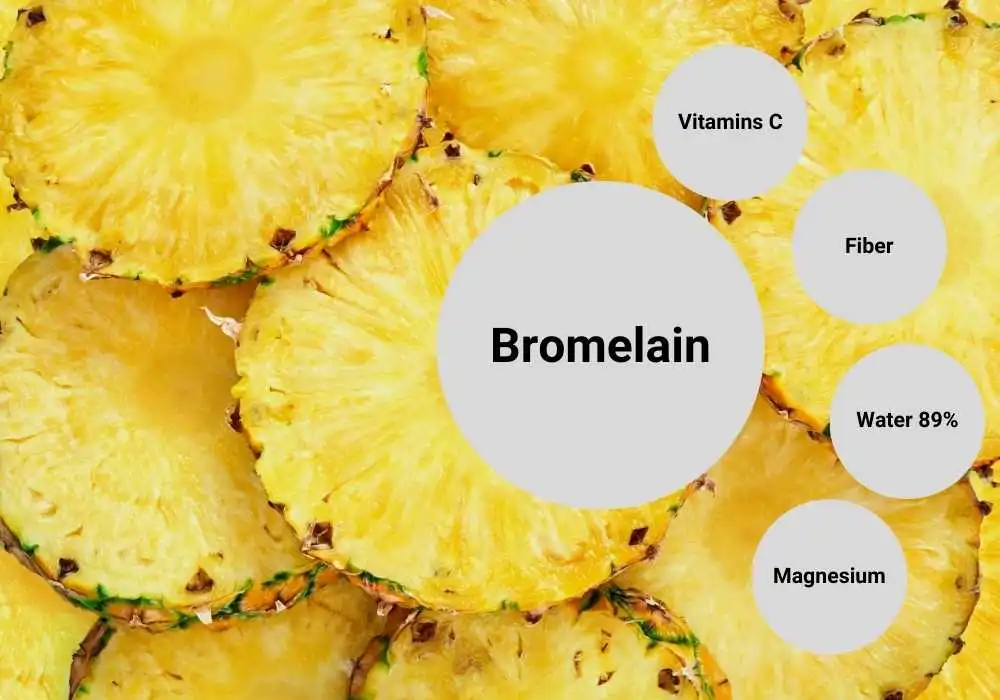
Pineapple, with its tropical allure and tangy sweetness, is not only a delightful treat but also a fruit that offers a range of nutritional benefits. Pineapple, which is known for its vibrant flavour and juicy texture, stands out as a tropical hydration source.
Nutritional Benefits:
Pineapple is not only a delicious tropical fruit but also a source of essential nutrients. Here are some key nutritional benefits of consuming pineapple:
Vitamin C: Pineapple is a rich source of vitamin C, a powerful antioxidant that supports the immune system, promotes collagen synthesis, and aids in wound healing.
Bromelain: Pineapple contains an enzyme called bromelain, which has anti-inflammatory properties and may help with digestion by breaking down proteins. Bromelain has also been studied for its potential benefits in reducing nasal congestion and inflammation.
Manganese: Pineapple is a good source of manganese, an essential mineral that plays a role in various enzymatic reactions, metabolism, and bone health.
Fiber: Pineapple provides dietary fiber, which is important for digestive health, regulating blood sugar levels, and promoting satiety.
Related: How To Counteract Dehydration This Summer
Water Content: Sweet and Juicy Refreshment:
Pineapple offers more than just its tropical flavour; it also provides a juicy and refreshing experience. With its high water content, pineapple quenches thirst and helps maintain hydration levels. The sweet and juicy nature of pineapple makes it a delightful choice for staying refreshed, especially during hot summer days.
Whether enjoyed as a juicy snack, added to smoothies, or incorporated into savoury dishes, pineapple offers a burst of tropical sweetness that not only satisfies the taste buds but also provides a hydrating and invigorating experience.
4. Oranges: Citrus Burst of Hydration
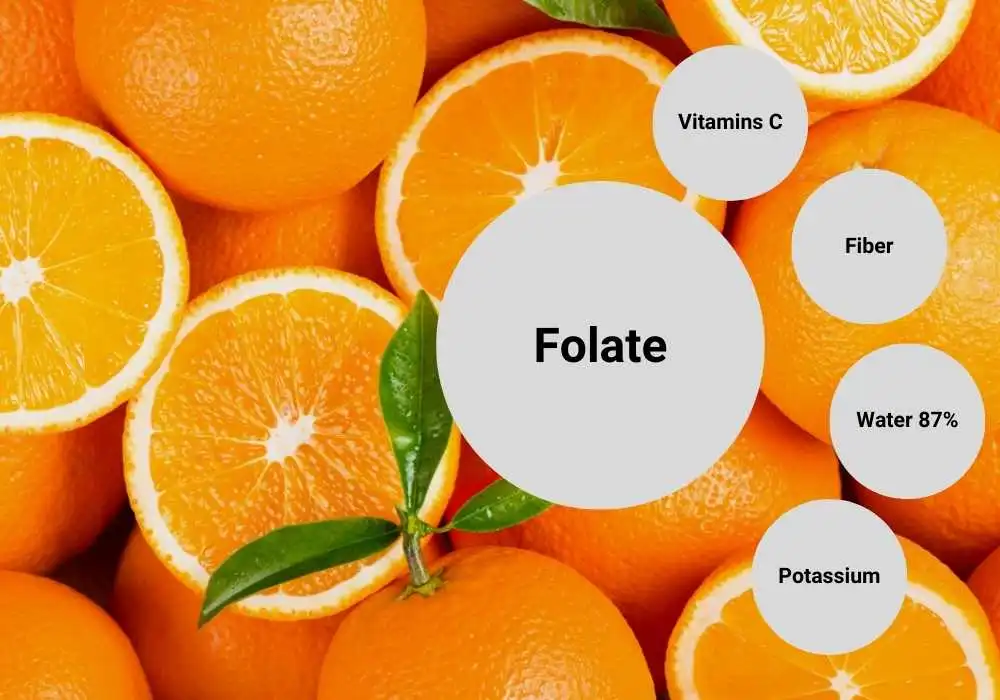
Oranges, with their vibrant colour and refreshing citrus flavour, are a popular fruit and a fantastic source of hydration. Bursting with tangy juiciness, oranges offer a range of nutritional benefits, making them a beloved choice for many.
Nutritional Benefits:
Oranges are not only delicious but also packed with essential nutrients. Here are some key nutritional benefits of consuming oranges:
Vitamin C: Oranges are well-known for their high vitamin C content. This potent antioxidant is crucial in supporting the immune system, collagen synthesis, wound healing, and protecting cells from damage.
Fiber: Oranges provide dietary fiber, which aids in digestion, promotes bowel regularity, and contributes to a feeling of fullness.
Potassium: Oranges are a good source of potassium, an essential mineral that
helps maintain proper fluid balance, supports nerve function, and regulates blood pressure.
Folate: Oranges contain folate, a B vitamin necessary for cell growth and development, essential for pregnant women to support fetal development.
Water Content: Tangy and Juicy Delight:
One of the most appealing aspects of oranges is their high water content, making them a hydrating and thirst-quenching fruit. Oranges are approximately 87% water, making them an excellent choice to help meet your daily hydration needs.
The tangy and juicy delight of oranges satisfies your taste buds and provides a refreshing experience, particularly during hot summer months or when needing a revitalizing pick-me-up. The natural sweetness combined with the hydrating properties of oranges makes them a perfect choice for hydration and enjoyment.
Related: Oranges Good For Losing Weight
5. Strawberries: Juicy Bite-Sized Hydrators
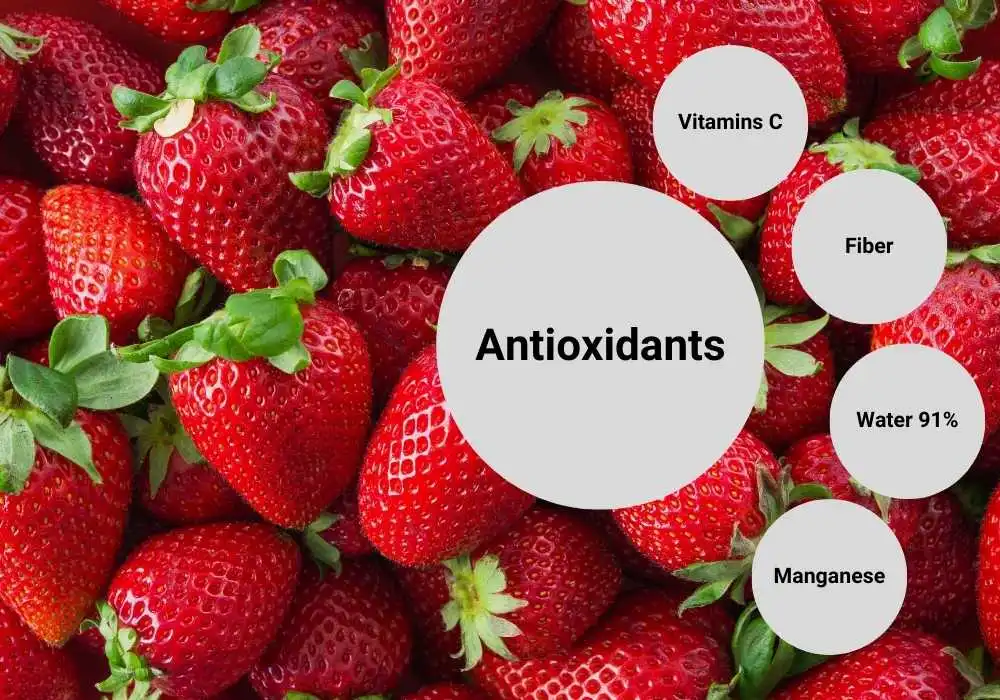
Strawberries, with their vibrant red hue and sweet-tart flavour, are a delightful summertime treat and a fantastic source of hydration. These juicy, bite-sized fruits are loved for their refreshing taste and are packed with various nutritional benefits.
Nutritional Benefits:
Strawberries are more than just a tasty fruit; they offer an array of essential nutrients. Here are some key nutritional benefits of consuming strawberries:
Vitamin C: Strawberries are a rich source of vitamin C, a powerful antioxidant that supports immune function and collagen synthesis and helps protect against cellular damage.
Fiber: Strawberries provide dietary fiber, which aids in digestion, promotes satiety, and supports healthy cholesterol levels.
Antioxidants: Strawberries contain various antioxidants, such as anthocyanins, flavonols, and ellagic acid. These compounds have potential health benefits, including reducing inflammation, improving cardiovascular health, and protecting against certain diseases.
Manganese: Strawberries are a good source of manganese, a mineral in metabolism, bone health, and antioxidant defence.
Related: Hydrating Fruits: Essential Precautions To Consider For Safe Consumption
Water Content: The Red and Refreshing Gems:
One of the remarkable characteristics of strawberries is their high water content. Strawberries are made of approximately 91% water and provide a refreshing and hydrating experience. Their juicy nature and vibrant red colour make them perfect for quenching thirst and replenishing fluids.
Whether enjoyed on their own, added to salads, blended into smoothies, or used as a topping, strawberries offer refreshing flavour and hydration. These red and refreshing gems make for a delicious and hydrating addition to any summer menu.
6. Grapefruit: Zesty and Quenching

Grapefruit, with its zesty flavour and tangy juiciness, is a citrus fruit that offers both a refreshing taste and a range of nutritional benefits. Grapefruit, which is known for its distinctive flavour profile, is a popular choice for those seeking a citrusy and quenching experience.
Nutritional Benefits:
Grapefruit is not only a delicious fruit but also a nutrient-rich addition to your diet. Here are some key nutritional benefits of consuming grapefruit:
Vitamin C: Grapefruit is an excellent source of vitamin C, a potent antioxidant that supports immune function, aids in collagen synthesis, and protects cells from oxidative damage.
Fiber: Grapefruit provides dietary fiber, which promotes healthy digestion, helps maintain satiety, and supports heart health by managing cholesterol levels.
Antioxidants: Grapefruit contains various antioxidants, including flavonoids, limonoids, and beta-carotene. These compounds contribute to the fruit’s potential health benefits, such as reducing inflammation and supporting overall well-being.
Potassium: Grapefruit is a good source of potassium, an essential mineral that plays a vital role in maintaining fluid balance, supporting nerve function, and regulating blood pressure.
Water Content: The Citrus Splash:
Grapefruit’s high water content adds to its reputation as a refreshing citrus splash. With approximately 88% water content, grapefruit provides hydration and quenches thirst. Its juicy nature and tangy flavour make it a popular choice for those looking for a refreshing burst of flavour.
Whether enjoyed on its own, added to salads, or used in beverages, grapefruit offers a zesty and invigorating experience. The combination of its high water content and vibrant citrus taste makes grapefruit a go-to choice for staying hydrated and enjoying a refreshing treat.
7. Peaches: Summary Hydration Treat
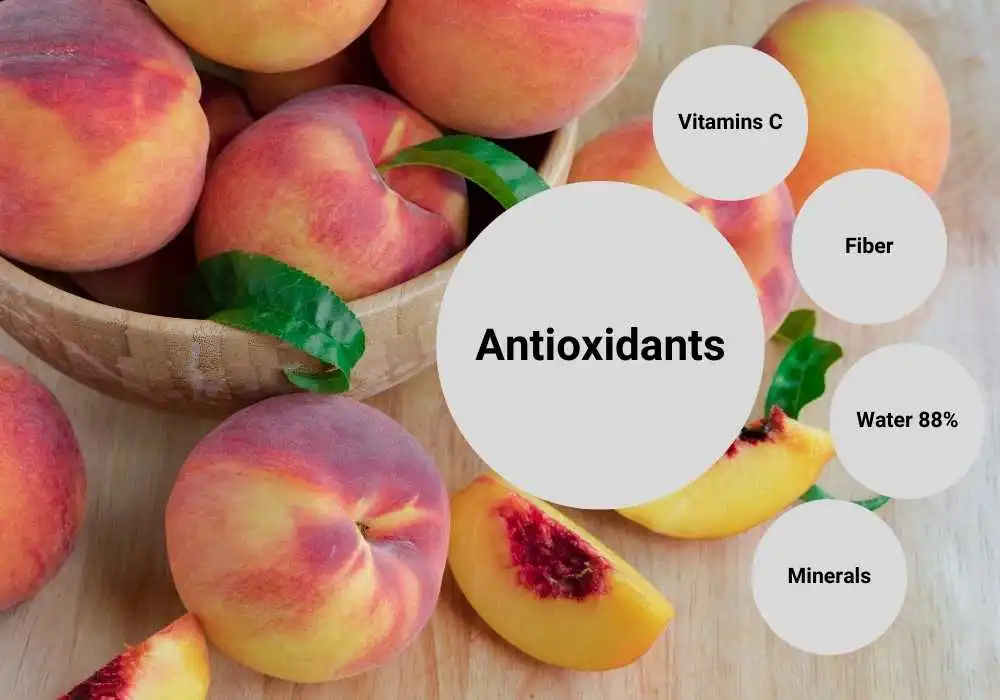
With their luscious texture and sweet scent, peaches are not just a delightful summer season fruit but also a hydrating treat that provides a range of dietary advantages. Peaches, known for their juicy and revitalizing nature, are a favourite amongst fruit enthusiasts.
Nutritional Benefits:
Peaches are a delicious fruit and a source of essential nutrients. Here are some essential nutritional benefits of taking in peaches:
Vitamins and Minerals: Peaches are abundant in vitamins A and C, necessary antioxidants that support immune function and skin health and promote collagen synthesis. They also provide minerals like potassium, vital for keeping fluid balance, nerve function, and regulating blood pressure.
Fiber: Peaches are a great source of dietary fiber, which aids in food digestion, supports bowel consistency, and promotes feelings of fullness.
Antioxidants: Peaches contain different antioxidants, including flavonoids and phenolic compounds. These antioxidants assist in safeguarding against oxidative stress, decrease inflammation, and have been connected with possible health advantages, such as improving heart health and reducing the risk of particular persistent illness.
Water Content: Juicy and Fragrant Delight:
One of the differentiating features of peaches is their high water content, which contributes to their juicy and fragrant pleasure. Peaches are approximately 88% water, making them a rejuvenating choice for maintaining hydration levels.
The juicy nature of peaches, integrated with their sweet scent, provides a sensory pleasure that quenches thirst and includes a burst of taste to your palate.
Whether enjoyed fresh, added to salads, combined into shakes, or used in desserts, peaches offer a juicy and fragrant experience that is both gratifying and hydrating.
8. Kiwi: The Vitamin C Hydrator
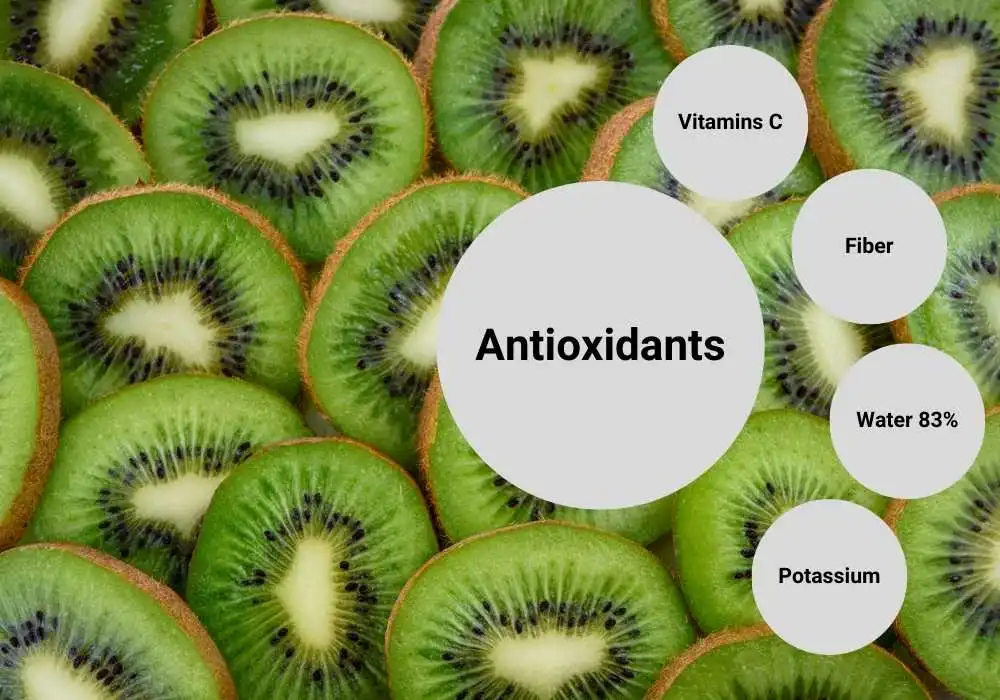
Kiwi, with its vibrant green flesh and unique appearance, is a visually appealing fruit and a hydrating powerhouse packed with nutritional benefits. Kiwi, known for its tangy and sweet flavour, is often hailed as a vitamin C-rich hydrator.
Nutritional Benefits:
Kiwi is a small fruit that packs a punch for nutrition. Here are some key nutritional benefits of consuming Kiwi:
Vitamin C: Kiwi is renowned for its exceptionally high vitamin C content. Just one medium-sized Kiwi provides more than the recommended daily vitamin C intake, supporting immune function and collagen synthesis and acting as an antioxidant in the body.
Fiber: Kiwi is a good source of dietary fiber, which aids digestion, supports bowel regularity, and helps maintain a healthy weight.
Antioxidants: Kiwi contains various antioxidants, such as polyphenols and flavonoids, contributing to its potential health benefits, including reducing inflammation and protecting against cellular damage.
Potassium: Kiwi is also a good source of potassium, an essential mineral that plays a crucial role in maintaining fluid balance, supporting heart health, and promoting proper muscle function.
Water Content: The Fuzzy Green Oasis:
While Kiwi is not the highest in water content compared to other fruits, it still contributes to hydration due to its juicy nature. Kiwi contains approximately 83% water, providing a refreshing and hydrating element.
The combination of its water content and vibrant green flesh makes Kiwi a visually appealing and refreshing oasis of hydration.
Whether enjoyed on its own, added to fruit salads, blended into smoothies, or used as a topping, Kiwi offers a tangy and refreshing experience that satisfies both the taste buds and the body’s need for hydration.
Related: H302 Water In Fruits
9. Raspberries: Bursting with Hydration
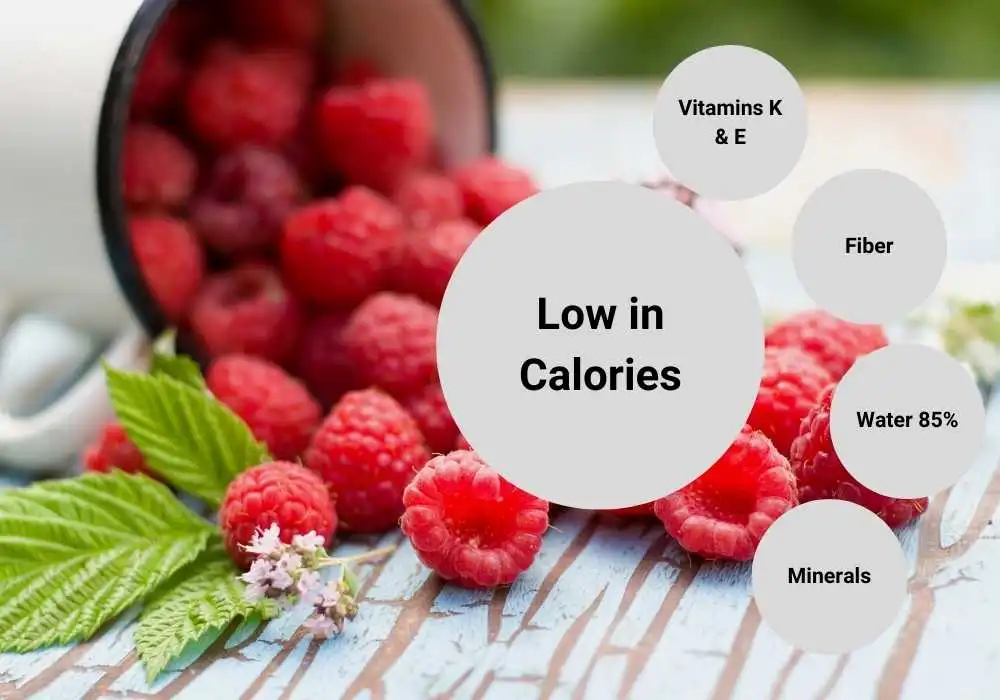
Raspberries, with their lively colour and delightfully sweet-tart taste, are a delightful reward and a fantastic source of hydration. These small, flavorful spheres are breaking with both taste and nutritional advantages.
Nutritional Benefits:
Raspberries are loaded with essential nutrients that add to general health and well-being. Here are some critical dietary benefits of taking in raspberries:
Fiber: Raspberries are an outstanding source of dietary fiber, which promotes healthy food digestion, helps in weight management, and supports heart health, consisting of reducing swelling, securing versus cellular damage, and supporting brain health.
Vitamins and Minerals: Raspberries consist of vitamins such as vitamin K, vitamin E, and folate, as well as minerals like manganese and potassium, which are essential for various bodily functions.
Low in Calories: Raspberries are relatively low in calories, making them a healthy choice for those enjoying their calorie consumption while enjoying a delicious snack.
Water Content: The Tiny Flavorful Spheres:
Despite their small size, raspberries have a surprisingly high water material, adding to their credibility as a hydration-friendly fruit.
Raspberries are approximately 85% water, making them an outstanding option for quenching thirst and remaining hydrated.
The juicy nature of raspberries improves their refreshing quality and contributes to the total pleasure of consuming these small delicious spheres.
Whether eaten by themselves, contributed to yogurt, used in shakes, or incorporated into numerous recipes, raspberries provide a burst of hydration in addition to their excellent taste.
10. Coconut: Tropical Hydration Haven

With its unique appeal and unmistakable tropical flavour, Coconut is not just a culinary pleasure but also a hydration sanctuary. This versatile fruit, frequently associated with beachside trips and rejuvenating beverages, uses a variety of dietary advantages and a high water content that make it the supreme thirst quencher.
Nutritional Benefits:
Coconut is a nutrient-dense fruit that offers a host of health advantages. Here are some crucial dietary advantages of consuming coconut:
Electrolytes: Coconut water, the clear liquid inside young green coconuts, is abundant in electrolytes such as potassium, salt, magnesium, and calcium. These electrolytes play an essential role in maintaining correct hydration, muscle function, nerve transmission, and balancing pH levels in the body.
Healthy Fats: Coconut is a unique source of healthy fats, particularly medium-chain triglycerides (MCTs), which are easily absorbed and used as a quick energy source. MCTs have been connected with various health advantages, including improved cognitive function, weight management, and heart health.
Dietary Fiber: Coconut includes dietary fiber, which aids food digestion, promotes satiety and supports a healthy gut. The fibre content in coconut can add to much better digestion and regular defecation.
Antioxidants: Coconut includes phenolic compounds, which help safeguard cells from oxidative tension and may have future anti-inflammatory results. These antioxidants add to overall well-being and may decrease the danger of chronic illness.
Water Content: The Ultimate Thirst Quencher:
Coconut, precisely the type of coconut water, is renowned for its extraordinary water material, which makes it an excellent option for hydration. Coconut water is naturally refreshing and roughly 95% water. Its composition resembles isotonic beverages, making it an ideal beverage to replenish fluids and electrolytes after physical activity or quench thirst on a hot day.
Coconut water is a natural and nutritious option for sugary beverages, providing a balance of hydration, minerals, and a subtle sweetness. Its tropical essence adds a refreshing twist to any drink or can be taken directly from the coconut.
11. Apples: Classic Hydrating Crunch
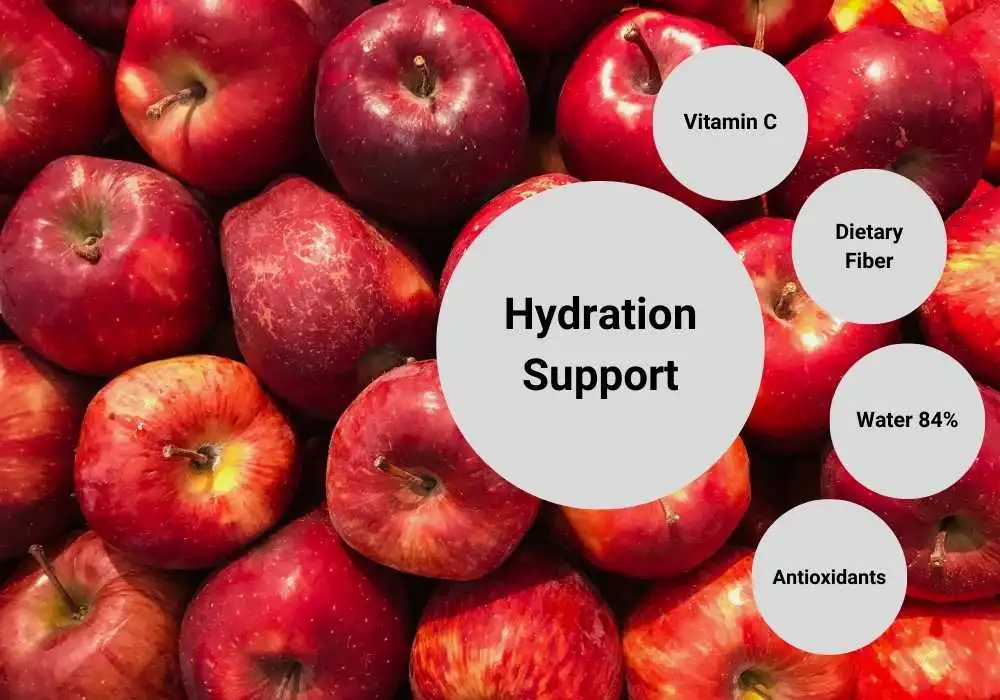
Apples, with their traditional appeal and satisfying crunch, are not only a beloved fruit but also a hydrating choice that uses a range of nutritional benefits. These crisp and rejuvenating fruits have earned credibility for their flexibility and are understood for their ability to quench thirst while offering essential nutrients.
Nutritional Benefits:
Apples are a dietary powerhouse packed with important nutrients that add to total health and wellness. Here are some essential dietary advantages of consuming apples:
Dietary Fiber: Apples are an excellent source of dietary fiber, a particularly soluble fiber called pectin. Fiber helps in digestion, supports a healthy gut, and helps keep steady blood sugar level levels.
Vitamins and Minerals: Apples contain a variety of minerals and vitamins, including vitamin C, potassium, and antioxidants like quercetin. These nutrients play essential functions in immune function, heart health, and securing cells from damage caused by complementary radicals.
Hydration Support: While apples may not have the greatest water material among fruits, their juicy flesh still contributes to hydration. Consuming apples assists contribute to your total daily fluid consumption and adds to preserving proper hydration levels.
Antioxidants: Apples are abundant in antioxidants, which help neutralise hazardous totally free radicals in the body and may minimise the danger of persistent illness like cardiovascular disease and particular kinds of cancer.
Water Content: Crisp and Quenching:
Apples, with their crisp texture and high moisture material, provide a refreshing and quenching experience. While the water content in apples can vary depending on the variety and ripeness, they normally include about 84% water, making them a hydrating option. The natural juice within apples adds to their refreshing quality and contributes to the general satisfaction of taking in these fruits.
Whether enjoyed as a standalone snack, sliced into salads, or used in various culinary preparations, apples use a crisp and satiating source of hydration that is not just scrumptious but also healthy.
Related: How Can I Hydrate Fast? 7 Proven Methods For Rapid Hydration
A Word from Blogzah
Embracing a healthier lifestyle includes making conscious choices about the food we consume. By incorporating hydrating fruits into our diet, we not only savour their delightful flavours but also benefit from their high water content. From the thirst-quenching watermelon to the tangy grapefruit, these 11 fruits serve as natural hydration sources, keeping us refreshed and revitalised. So, next time you feel parched, reach out for these hydrating wonders and let them work their magic. Stay hydrated, stay healthy!
Reference:
United States Department of Agriculture. (2016). Watermelon – Hydration For Health. Retrieved from
Cucumber: U.S. Department of Agriculture. (2021). Cucumber, with peel, raw. FoodData Central.
U.S. Department of Agriculture. (2021). Pineapple, raw. FoodData Central.
U.S. Department of Agriculture. (2021). Oranges, raw. FoodData Central.
U.S. Department of Agriculture. (2021). Strawberries, raw. FoodData Central.
U.S. Department of Agriculture. (2021). Grapefruit, raw. FoodData Central. U.S. Department of Agriculture. (2021). Peaches, raw. FoodData Central.



